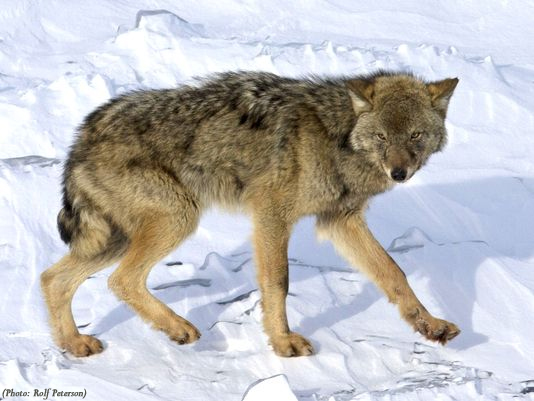
Wolf populations in Minnesota, Wisconsin and Michigan have successfully recovered and should be taken off the Endangered Species list, according to a letter sent today to U.S. Secretary of the Interior Sally Jewell and U. S. Fish and Wildlife Service Director Dan Ashe from 26 U.S. and Canadian wolf and wildlife experts.
“[I]t is in the best interests of gray wolf conservation and for the integrity of the [Endangered Species Act] for wolves to be delisted in the western Great Lakes states where biological recovery has occurred and where adequate regulatory mechanisms are in place to manage the species,” wrote the scientists.
“We believe that failure to delist wolves in these states is counterproductive to wolf conservation there and elsewhere where suitable habitat may exist. The integrity and effectiveness of the ESA is undercut if delisting does not happen once science-based recovery has been achieved.”
Gray wolves in the Great Lakes region of the United States have been federally listed as endangered since 1967 and federally protected since 1974. Since 1999 the wolf population in the Great Lakes region—Minnesota, Wisconsin and Michigan—met federal goals for delisting.
Wolves were absent for generations from Great Lakes states except for Minnesota and Isle Royale National Park in Michigan. Protections afforded under the Endangered Species Act allowed wolves to re-colonize the upper Great Lakes states of Minnesota, Wisconsin and Michigan, according to David Mech, a leading wolf researcher at the University of Minnesota.
Now there are more than 3,700 wolves in those states. “Wolf recovery is a tremendous success story,” Mech said.
The species has been taken off the endangered species list and put back on the list several times due to litigation. The scientists are urging the U.S. Fish and Wildlife Service to delist again based on the overwhelming view of professional biologists and wildlife managers that wolves have biologically recovered.
“Now it’s time to recognize that success and take the next logical step: removing them from the list of endangered species so that state wildlife professionals can manager wolves locally,” added Adrian Wydeven, coordinator of the Timber Wolf Alliance at Northland College in Ashland, Wisconsin.
Wydeven, a former Wisconsin DNR wolf biologist, oversaw Wisconsin’s wolf recovery program from 1990 to 2013.
“Once a species has recovered, management responsibilities should return to the states and federal funding should be applied to species that truly are endangered,” Wydeven said. “State wildlife managers were instrumental in bringing back wolves to the upper Great Lakes states, and now it’s important that they use their professional expertise to make sure that wolves are a part of our landscape for now and generations to come.”




